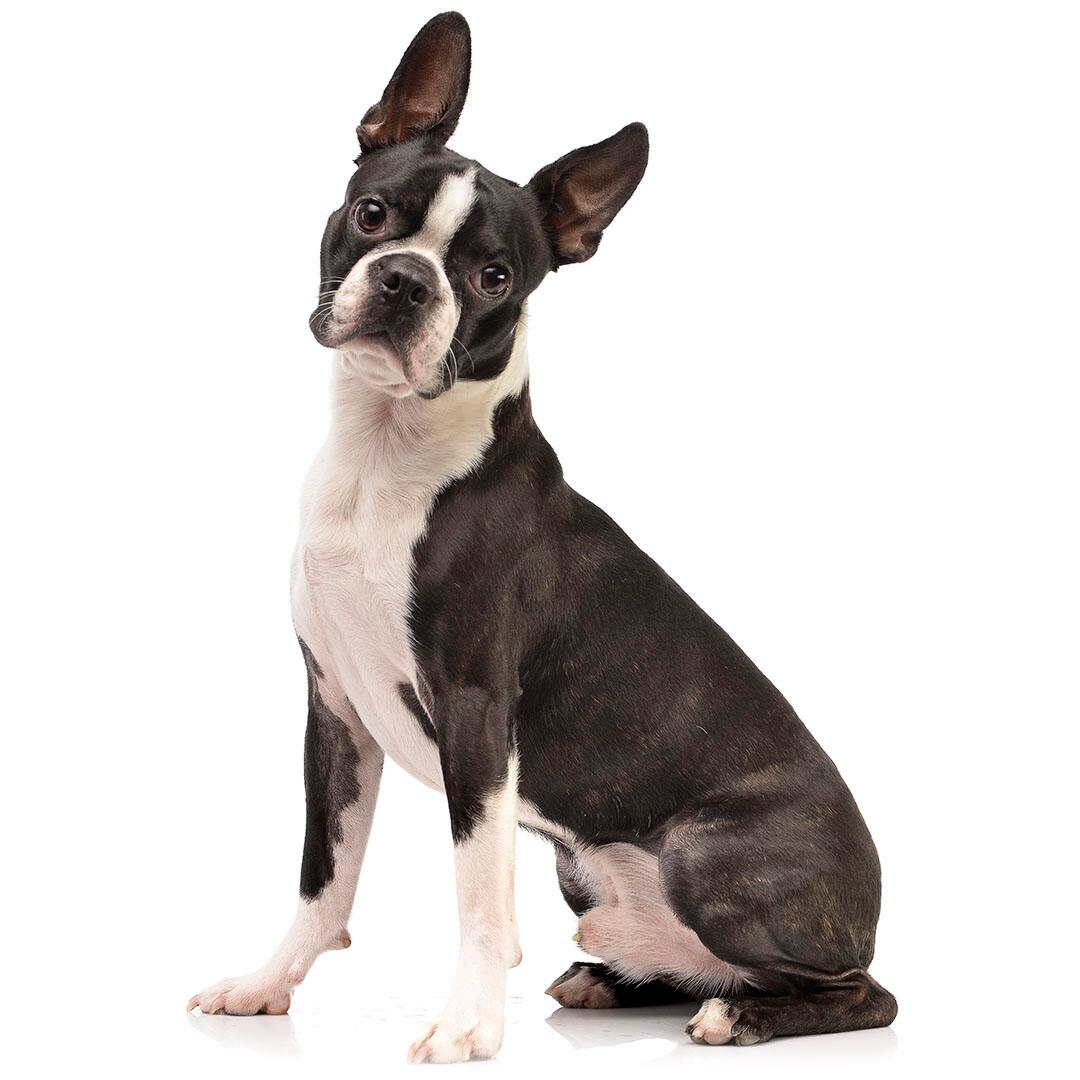
| Family-friendly: | 4/5 |
| Exercise needs: | 4/5 |
| Easy to train: | 4/5 |
| Tolerates being alone: | 3/5 |
| Likes other pets: | 5/5 |
| Energy level: | 4/5 |
| Grooming needs: | 3/5 |
| Shedding: | 2/5 |
The Boston Terrier breed is classified as brachycephalic; problems associated with the condition include;
- Brachycephalic obstructive airway syndrome: a condition in brachycephalic breeds (those with a short nose and squashed face) where breathing is obstructed and can lead to reduced ability to exercise, or even severe respiratory distress.
- Skin inflammation/infection: brachycephalic breeds have a short nose and a normal amount of facial tissue. This means there is often excess skin around their face which leads to skin folds. The skin inside these folds can become sore and infections are prone to develop.
- Eye ulcers: ulcers are painful erosions on the surface of the eye. They are more common in brachycephalic breeds due to their conformation, as their eyes tend to be more bulbous.
The breed is also prone to:
- Patellar luxation.
- Hemivertebrae¹ which is a problem where dogs are born with spine deformities.
- Cushing's syndrome, which is where too much natural steroid hormone is produced which can lead to symptoms such as excessive drinking and tiredness.
- Hereditary cataracts which is a condition where the lens in the eye becomes cloudy and this can result in blindness.
- Keratoconjunctivitis sicca (dry eye) which is a painful condition where the tear gland stops working properly.
- Cherry eye which is where a gland within the third eyelid pops up in the corner of the eye.
Priority Kennel Club health schemes and testing:
- Eye screening scheme
- DNA testing for hereditary cataracts which tests whether or not a dog has the potential to be affected by this condition.
¹E. Schlensker and O. Distal, 'Prevalence, grading and genetics of hemivertebrae in dogs' 2013, European Journal of Companion Animal Practice.
The Boston Terrier is a lively, happy dog that can be quite determined and strong willed. They are usually good with children and love to play, but they can be boisterous and care must be taken that games are not too rough, as they can be prone to injury, especially their eyes. They love human company and make affectionate pets and are outgoing and social to all. While they are called a ‘terrier’ they are not in the terrier group and neither do they behave like one, being far happier at home with their owner than getting into the usual mischief!
The Boston Terrier would suit an owner who enjoys their unconventional appearance and who wants a fun, affectionate companion that doesn’t need much exercise but does want to join in with everything that is going on.
| Family-friendly: | 4/5 |
| Exercise needs: | 4/5 |
| Easy to train: | 4/5 |
| Tolerates being alone: | 3/5 |
| Likes other pets: | 5/5 |
| Energy level: | 4/5 |
| Grooming needs: | 3/5 |
| Shedding: | 2/5 |
In the 1800s, the Boston Terrier dog breed was originally a cross between an English Bulldog and an English White Terrier. Then around 1893, more crossbreeding was carried out, seeing the breed crossed with the English Bull Terrier, Boxer and the Pit Bull Terrier, along with other terriers. Originally the Boston Terrier weighed over 20kg, but was bred smaller and smaller until they became the size we know them as today.
Suitable for first time owners, the Boston is a fun-loving companion who will love life with someone who enjoys training and is around most of the day. Owners must be aware of the health issues that short-nosed breeds can suffer from as these can involve costly vet bills.
The exercise requirements of this dog are quite undemanding; about an hour's daily exercise will be needed. They do not yearn for long walks, but they do like to go everywhere with their owners.
The Boston Terrier makes a great urban companion and can live in a small space as long as they have access to the outdoors for exercise and toileting.
Small dogs have a fast metabolism, meaning they burn energy at a high rate, although their small stomachs mean that they must eat little and often. Small-breed foods are specifically designed with appropriate levels of key nutrients and smaller kibble sizes to suit smaller mouths. This also encourages chewing and improves digestion.
The Boston Terrier breed is easily groomed. A grooming mitt used on the coat once a week should be adequate enough to remove any dead hairs from the coat. This is a clean breed with no doggie odours.
The Boston Terrier will enjoy basic training and should be taught to walk on a harness and lead and also to come back when called.
Boston Terriers make good family dogs as they will join in with family games and are friendly and social. They do better with sensible, older children though as they can be prone to eye injuries.
While many dogs are traditionally thought of as being good with children, all dogs and children need to be taught to get on with and respect each other, and be safe together. Even so, dogs and young children should never be left alone together and adults should supervise all interactions between them.